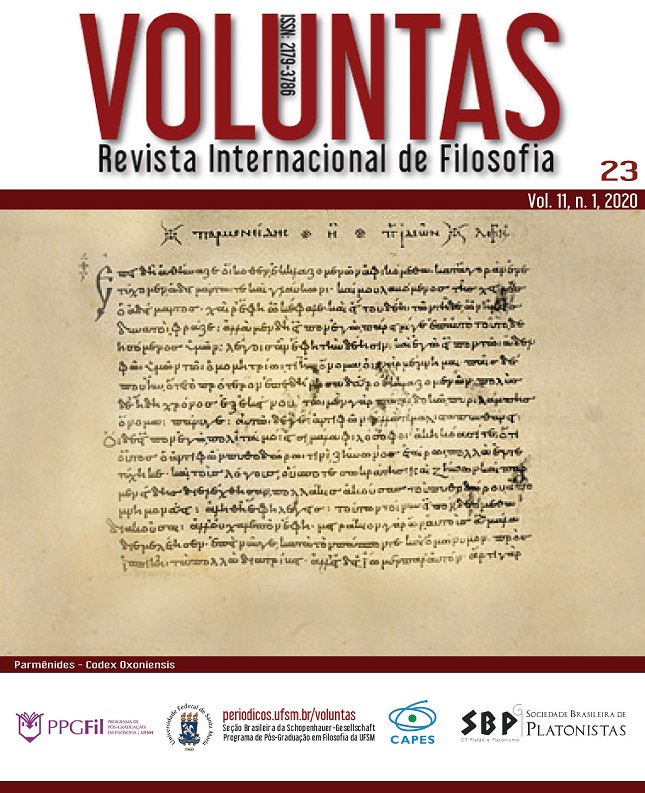Arthur Schopenhauer's “phenomenology of ethical life”
DOI:
https://doi.org/10.5902/2179378639793Schlagworte:
Morals, Compassion, Justice, Charity, Science, GoodnessAbstract
We propose to analyse and interpret in what sense Philonenko’s description that Schopenhauer developed a “phenomenology of ethical life” can be read without complications: if we stick it to his empirical foundation of morals, exposed in On the Foundation of Morals. If we extend it to the philosopher's metaphysics of customs, as Philonenko did, this expression will be inadequate, because the latter does not have the phenomena as its object, but what “hides behind them (...) the thing in itself”. This clarification will also help us to show in what sense Schopenhauer scientifically innovated in morals, by redirecting human actions to three fundamental reasons: the well-being of others, of ourselves and the discomfort of others (predicated, respectively, by selfishness, goodness and malevolence); and by explaining the possibility of the second motivation as coming from the feeling of compassion (which is divisible in a negative degree, that of justice, and a positive one, charity).
Downloads
Literaturhinweise
ARAMAYO, R. Estudio preliminar. In: Schopenhauer, A.. Los designios del destino. Trad.: R. Aramayo. Madrid: Ed. Tecnos. 2008.
BACELAR, K. O desenvolvimento da psicologia moral de Schopenhauer. Revista Sofia. Vitória/ES, v. 7, n. 2, 2018.
BACELAR, K. Sobre a quarta motivação na psicologia de Schopenhauer. In: Deyve, R. (Org.). Arthur Schopenhauer no Brasil. João Pessoa: Ideia. 2010.
CHEVITARESE, L. A eudemonologia empírica de Schopenhauer: a ‘liberdade que nos resta’ para a prática de vida. In: Deyve, R. (Org.). Arthur Schopenhauer no Brasil. João Pessoa: Ideia. 2010.
CLAROS, Luis F. Estúdio introductorio. Arthur Schopenhauer. El mundo como voluntad y representación (Volumen primero). Madrid: Ed. Gredos.
DAMASCENO, F. Ética e metafísica em Schopenhauer: a coexistência da Vontade livre com a necessidade das ações. Fortaleza/CE: Dissertação de mestrado. UFCE. 2012.
DEBONA, V. Bemerkungen ou Beobachtungen? sobre as “observações psicológicas” de Schopenhauer e Rée. Trans/Form/Ação, Marília, v. 42, n. 1, p. 153-178, 2019.
DEBONA, V. A Grande e a Pequena Ética de Schopenhauer. Ethic@. Florianópolis/ Santa Catarina, v.14, n.1, p.36-56, Jul. 2015.
DESCARTES, R. Meditações. Trad.: J. Guinsburg e Bento Prado Jr.. In: Descartes, R. Coleção ‘Os pensadores’. São Paulo: Abril Cultural, 1973.
DESCARTES, R. Discurso do Método. Trad.: J. Guinsburg e Bento Prado Jr.. In: Descartes, R. Coleção ‘Os pensadores’. São Paulo: Abril Cultural, 1973.
DEUSSEN, P. Schopenhauer und die Religion. In: Deussen, P. (Org.). Viertes Buch der Schopenhauer-Gesellschaft – 1915. Colônia: Verlag der Schopenhauer-Gesellschaft, 1915.
FAZIO, D., KOSSLER, M., LÜTKEHAUS, L. La Scuola di Schopenhauer: Testi e contesti. Lecce: Pensa Multimedia, 2009.
HEIDEGGER, M. El ser y el tempo. Trad.: J. Gaos. Mexico: Fondo de cultura económica. 2007.
KANT, I. Fundamentação da Metafísica dos Costumes. Trad.: Paulo Quintela, In: Kant, I. Coleção ‘Os Pensadores’, São Paulo: Abril, vol. 25, 1974.
LEFRANC, J. Compreender Schopenhauer. Trad.: Ephraim Ferreira Alves, Petrópolis-RJ: Vozes, 2005.
MAGEE, B. Schopenhauer. Trad.: A. Bárcena. Madrid: Cátedra. 1991.
MANN, T. Schopenhauer, Nietzsche, Freud. Tradução: Andrés S. Pascual. Madrid: Alianza Editorial, 2008.
MARÍA, Pilar L. de Santa. Introducción. In: Schopenhauer, A.. Los dos problemas fundamentales de la ética. Madrid: Siglo Veintiuno de España Editores.
NIETZSCHE, F. Humano, Demasiado Humano. Trad.: P. C. de Souza. São Paulo: Companhia das Letras. 2005.
NIETZSCHE, F. Genealogia da Moral: uma Polêmica. Trad.: P. C. de Souza. São Paulo: Companhia das Letras, 1998.
NIETZSCHE, F. Más allá del bien y del mal. Trad.: A. S. Pascual. Madrid: Alianza Ed.. 2005.
PHILONENKO, A. Schopenhauer – Una filosofía de la tragedia. Trad.: G. Muñoz-Alonso. Barcelona: Editorial Anthropos.
RÉE, P. Der Ursprung der moralischen Empfindungen. Chemnitz: Verlag von E. Schmeitzner. 1887.
RIBOT, T. Schopenhauer y su filosofia. Trad.: M. A.. Buenos Aires: Ed. Americalee. 1946.
SAFRANSKI, R. Schopenhauer e os anos mais selvagens da filosofia. Trad.: W. Lagos. São Paulo: Geração Ed.. 2011.
SCHOPENHAUER, A. Parerga und Paralipomena – Band I und II. In: Schopenhauer, A.. Sämtliche Werke – Band IV - V. Org.: W. F. von Löhneysen. Stuttgart/Frankfurt am Mein: Suhrkamp, 1986.
SCHOPENHAUER, A. Kritik der Kantischen Philosophie. In: Schopenhauer, A.. Sämtliche Werke – Band I. Org.: W. F. von Löhneysen. Stuttgart/Frankfurt am Mein: Suhrkamp, 1986.
SCHOPENHAUER, A. Sobre o fundamento da moral. Trad.: Maria Lúcia de Mello Oliveira Cacciola, São Paulo: Editora Martins Fontes, 2001.
SCHOPENHAUER, A. O Mundo como Vontade e como Representação. Trad.: Jair Barboza, São Paulo: Editora Unesp, 2005.
SCHOPENHAUER, A. O Mundo como Vontade e como Representação – Tomo II. Trad.: Jair Barboza, São Paulo: Editora Unesp, 2015.
SCHOPENHAUER, A. De la Cuadruple de la Raiz del Principio del Razón Suficiente. Trad.: Leopoldo Eulogio Palacios, Madrid: Editorial Gredos, 1998.
SCHOPENHAUER, A. Prólogo a la primera edición de los dos problemas fundamentales de la ética. In: Schopenhauer, A. Sobre la Libertad de la Voluntad. Trad.: Eugenio Imaz, Madrid: Alianza Editorial, 2002. 199p.
SCHOPENHAUER, A. Metafísica do Belo. Trad.: Jair Barboza, São Paulo: Editora Unesp, 2003.
SCHOPENHAUER, A. Aforismos para a sabedoria de vida. Trad.: Jair Barboza, São Paulo: Martins Fontes, 2006.
SCHOPENHAUER, A. Metafísica de las costumbres. Trad.: R. R. Aramayo. Madrid: Ed. Trotta. 2001.
Veröffentlicht
Zitationsvorschlag
Ausgabe
Rubrik
Lizenz
Die Einreichung von Originalen an diese Zeitschrift impliziert seitens der Autoren die Übertragung der Rechte zur gedruckten und digitalen Veröffentlichung. Die Urheberrechte für die publizierten Artikel liegen beim Autor, wobei der Zeitschrift das Recht zur Erstveröffentlicheng zukommt. Die Autoren dürfen dieselben Resultate in anderen Publikationen verwenden, wenn sie deutlich auf unsere Zeitschrift als ursprüngliches Publikationsmedium hinweisen.
Lizenz
Creative Commons Namensnennung - Nicht-kommerziell - Weitergabe unter gleichen Bedingungen 4.0 International (CC BY-NC-SA 4.0).






